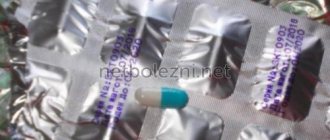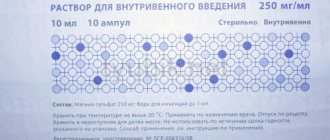Pharmacodynamics and pharmacokinetics
The active ingredient Betaloc reduces or eliminates the stimulating effect of catecholamines during stress and exercise, reduces myocardial contractility and cardiac output, reduces high blood pressure and heart rate. In addition, metoprolol reduces myocardial oxygen demand and prolongs diastole.
The drug may slightly increase TG levels and also slightly reduce HDL fractions and free fatty acid levels in the blood plasma.
The tablets are characterized by a delayed release of the active substance, so the concentration of the drug in the blood plasma remains unchanged, which ensures a stable clinical effect for a day or more. The drug is better tolerated than its analogues, and the risk of developing unwanted side effects is significantly reduced.
Betaloc ZOK is completely absorbed. Absorption does not depend on the timing of meals. The degree of connection with blood plasma proteins is 5-10%. The active substance is metabolized in the liver to form three metabolites without beta-blocking activity.
About 95% of the drug is excreted in the urine, the remaining amount remains unchanged. The half-life averages 3-4 hours.
pharmachologic effect
Manufacturer: Astra Zeneca, Sweden
Release form: extended-release tablets
Active ingredient: Metoprolol
Synonyms: Egilok Retard, Metoprolol Retard, Metoprolol KRKA
Betaloc ZOK is a selective beta-1 adrenergic blocker, that is, it blocks mainly beta-1 adrenergic receptors, reducing cardiac output, slowing the rhythm, facilitating myocardial stimulation during physical and mental stress, preventing reflex tachycardia. The drug inhibits the activity of the renin-angiotensin system, restores the sensitivity of baroreceptors, which, together with a decrease in cardiac output, causes a rapid hypotensive effect.
By reducing the frequency and strength of myocardial contractions, as well as its need for oxygen, Betaloc ZOK has an antianginal (anti-ischemic) effect.
The drug slows down the sinus rhythm and the rate of propagation of excitation through the atrioventricular node, inhibits the automaticity of the heart, lengthens the refractory period, and reduces the force of heart contractions. Thanks to these effects, the drug has an antiarrhythmic effect.
Since in therapeutic doses the drug does not affect beta-2 adrenergic receptors, bronchospasm, decreased sugar and constriction of peripheral vessels do not occur.
Betaloc lowers blood pressure, but is not a diuretic.
Indications for use
What are Betaloc ZOK tablets for? First of all, they are prescribed to patients with:
- arterial hypertension;
- heart rhythm disturbances;
- angina pectoris;
- functional disorders of the heart, which are accompanied by tachycardia .
As an element of therapy, the drug is used for chronic heart failure . In addition, Betaloc ZOK is used to reduce mortality and the likelihood of recurrent infarction after the acute phase of myocardial infarction , as well as as a prophylactic against migraine .
Egilok or Betalok ZOK – which is better, what’s the difference
Manufacturer: Egis, Hungary
Release form: tablets
Active ingredient: Metoprolol
Synonyms: Metoprolol Teva, Metoprolol KRKA, Serdol, Metocard
A substitute for Betalok ZOK, the drug Egilok is produced in the form of regular and retard forms. Egilok Retard is a complete synonym for Betalok ZOK, since it is also a prolonged release form of the active substance.
Egilok is taken twice a day, Egilok retard is taken once. The drug has the same effect as Betaloc ZOK; it is used for hypertension, arrhythmia, angina pectoris, and for maintenance after myocardial infarction.
The use of Egilok's analogue reduces the risk of mortality in patients after a heart attack.
Contraindications
This drug is contraindicated in cases of atrioventricular block II-III degree, therapy with inotropic agents to activate beta-adrenergic receptors, sick sinus syndrome, peripheral arterial circulation disorders, heart failure in the decompensation phase, clinically significant sinus bradycardia , cardiogenic shock , as well as hypersensitivity to beta-adrenergic blockers and any component of the drug.
In addition, Betaloc ZOK is not suitable for patients with acute myocardial infarction with a heart rate less than 45 per minute, systolic blood pressure less than 100 mm Hg. Art. or the duration of the P-Q interval on the ECG is more than 0.24 s.
Side effects
As a rule, when used correctly, the medicine is well tolerated by patients to whom it is prescribed. Side effects are minor or easily reversible.
Cardiovascular system: bradycardia , coldness of the extremities, increased manifestations of heart failure , orthostatic hypotension , cardiogenic shock , edema, pain in the heart, fainting, palpitations, first degree atrioventricular block arrhythmia .
Gastrointestinal tract: nausea , diarrhea , vomiting , abdominal pain, constipation .
Skin: rash, increased sweating.
Metabolism: increased body fat.
CNS: increased fatigue, headache , convulsions, problems concentrating, insomnia , dizziness , paresthesia , depression , drowsiness , nightmares.
Respiratory organs: shortness of breath , bronchospasm .
In rare cases, when taking the drug, the following are possible:
- gangrene;
- increased nervous excitability;
- memory impairment;
- hallucinations;
- anxiety;
- depression;
- dryness of the oral mucosa;
- hepatitis;
- hair loss;
- exacerbation of psoriasis ;
- liver dysfunction;
- photosensitivity;
- rhinitis;
- visual impairment;
- conjunctivitis;
- taste disturbances;
- irritation and/or dry eyes;
- tinnitus;
- arthralgia;
- thrombocytopenia;
- impotence , sexual dysfunction .
Let's sum it up
The most common and cheapest analogue of Betaloc is Metoprolol - a drug with this name is produced by different manufacturers, so choosing a suitable product will not be difficult. Bisoprolol is no less popular, but its cost is much higher than that of metoprolol.
Table of Betalok analogues
| A drug | Active substance | Manufacturer | price, rub. |
| Vasocardin | Metoprolol | Zentiva JSC, Slovak Republic | 80 |
| Metoprolol | Metoprolol | Salutas Pharma GmbH, Germany, Farmak, PJSC, Ukraine, Akrikhin, KhFK, OJSC, Russian Federation | 45 |
| Egilok | Metoprolol | Egis, Pharmaceutical Plant, JSC, Hungary | 75 |
| Metocore | Metoprolol | Adifarm EAT, Bulgaria | 95 |
| Concor | Bisoprolol | Merck KGaA, Germany | 400 |
| Implicor | Ivabradine, metoprolol | Lab. Servier Industry, France | 1300 |
| Bisoprolol | Bisoprolol | Salutas Pharma GmbH, Germany | 220 |
| Logimax | Metoprolol, felodipine | AstraZeneca AB, Sweden | 360 |
All analogues of Betalok and Betalok ZOK belong to the category of beta-blockers - drugs that have a positive effect on the activity of the cardiovascular system, reduce the risk of heart attack and other serious complications. However, they have significant differences in the mechanism of action, the list of side effects and contraindications.
The appropriate drug must be selected depending on the clinical course of the disease, the severity of symptoms and the characteristics of the patient’s body. The cost of the medicine in this case plays a secondary role, since the wrong choice can lead to unpleasant health consequences. Before taking Betaloc, Betaloc ZOK and their substitutes, you should definitely consult your doctor.
Instructions for use of Betaloc ZOK (Method and dosage)
Instructions for use of Betaloc ZOK include taking the drug once daily, regardless of meals (preferably in the morning). Tablets should not be crushed or chewed. During dosage selection, heart rate should be monitored.
Arterial hypertension : 50 mg per day (if the therapeutic effect is not achieved, the dose can be gradually increased to 100-200 mg per day, while Betaloc ZOK tablets, instructions for use, can be combined with other antihypertensive drugs).
Stable chronic heart failure of functional class III-IV : to begin with, a dosage is prescribed - 12.5 mg per day (1/2 tablet of 25 mg). If necessary, the dose is gradually increased, but this must be done strictly under the supervision of a doctor. After 14 days, the initial dosage is increased to 25 mg per day; after another 2 weeks, 50 mg per day can be prescribed. Thus, every 14 days the dose can be doubled until a maximum dosage of 200 mg is reached. However, the dose should not be increased until there is clear evidence that the patient is stable. Kidney function needs to be monitored.
Stable chronic heart failure of functional class II : at the beginning, a dose of 25 mg is prescribed. After the first 2 weeks, it can be increased to 50 mg per day, and then doubled every 14 days until a therapeutic effect is achieved. The maximum dosage is 200 mg per day.
For migraine prevention, 100–200 mg per day is prescribed.
For angina pectoris, 100–200 mg per day is prescribed (can be combined with other drugs for the treatment of angina pectoris).
For arrhythmia, 100–200 mg per day is prescribed.
Cardiac disorders with palpitations: 100 mg per day (if necessary, the dosage can be increased to 200 mg).
Analogues and substitutes
Betaloc is difficult to classify as an inexpensive drug, so many patients are interested in cheap substitutes and analogues of the drug. Modern pharmacology offers many drugs that have similar effects, but the list of contraindications and features of their effects may be different.
Egilok
Egilok is a drug that is most often prescribed to patients as a substitute for Betalok and Betalok ZOK. Its active substance is metoprolol tartrate, that is, the therapeutic effect is similar to Betaloc. Egilok is prescribed for disorders of cardiovascular activity (arrhythmia, extrasystole), arterial hypertension, migraines, coronary artery disease, and sometimes for dysfunction of the thyroid gland. The list of additional components of drugs differs slightly, so people with an increased tendency to allergic reactions need to carefully choose the drug.
Bisoprolol
The main active ingredient of the drug is Bisoprolol, which is considered a classic beta-blocker and has been used to treat cardiovascular disorders for more than 40 years. It has an antiarrhythmic and antihypertensive effect, reduces the severity of cardiovascular disorders and prevents the risk of heart attack.
All Betalok analogues are potent drugs and are therefore sold in pharmacies with a prescription.
Despite the similar list of indications, the mechanism of action of metoprolol and bisoprolol is different. Betaloc has a wider list of indications and is less likely to cause unwanted reactions in the body.
The most common side effect when using Betaloc is increased fatigue and decreased performance, and Bisoprolol most often causes bradycardia and decreased blood pressure.
Metoprolol
The drug is a complete analogue of Betaloc, since its mechanism of action is based on metoprolol tartrate. The list of indications, contraindications and side effects for the drugs is also the same, but when purchasing Metoprolol you should pay attention to additional components, the content of the active substance and the manufacturer. The drug is produced by different companies, both Russian and foreign - the former are cheaper, and the latter are considered safer and of higher quality.
Concor
The main active ingredient of the popular product Concor is bisoprolol fumarate. They belong to the same pharmacological group and are used for the treatment and prevention of cardiac disorders, but there are significant differences in the characteristics of their effects.
If Bisoprolol is considered the “gold” standard in the treatment of heart diseases, then Metoprolol, according to patient reviews, is better tolerated by the body.
Concor has a long-lasting therapeutic effect that lasts for 12 hours. The duration of action of Betalok is 4 hours, so the dose must be repeated 2 or 3 times a day.
The side effects of the drugs also differ, which must be taken into account in the presence of concomitant diseases.
- Concor
can cause serious mental disorders, hearing and vision impairment - a particularly common reaction is a decrease in lacrimation, which should be taken into account by people who wear contact lenses; - Metoprolol
does not affect the organs of vision and hearing, but quite often provokes allergic reactions, which are manifested by rash, itching and hives.
When choosing a drug, you should also take into account the fact that Concor is considered a potent drug, while Bisprolol has a gentle effect on the body.
Implicor
Implicor is a combination drug of French origin, and it contains two components - metoprolol and ivabradine. The latter refers to substances that can slow down the heart rate and regulate heart rate. Implicor is a new pharmacological agent, but has already earned positive reviews as an effective drug. Thanks to the content of two components, it has a quick effect and relieves symptoms of cardiovascular disorders.
At the same time, Implicor has a fairly wide list of contraindications and side effects, so it must be used with extreme caution. Betaloc and Betaloc ZOK have a gentler effect on the body, cause side effects less often, and their cost is much lower, but if there are appropriate medical indications, it is better to give preference to Implicor.
Logimax
A Swedish combination drug that includes the calcium antagonist felodipine and the beta blocker metoprolol. They complement each other’s effects, due to which the product has a pronounced prolonged effect. It is enough to take Logimax once a day, which distinguishes it from Betaloc, which requires two or three doses.
The disadvantage of this product is that, like all combination drugs containing several components, it has a fairly wide list of contraindications and side effects. In addition, Betaloc and Betaloc ZOK are considered the drugs of choice for cardiac disorders, and Logimax is used primarily to reduce arterial hypertension.
Overdose
There are cases where, at a dosage of 7.5 g, the drug caused severe intoxication with a fatal outcome in an adult. At doses of 1.4 and 2.5 g, respectively, there was moderate and severe intoxication.
An overdose of this drug can lead to respiratory depression, atrioventricular block I–III degrees, decreased blood pressure, heart failure, bradycardia , asystole , weak peripheral perfusion , cardiogenic shock , apnea . In addition, Betaloc ZOK in increased doses can cause impairment of consciousness, tremor , excessive sweating and fatigue, bronchospasm , vomiting, hypoglycemia or hyperglycemia , renal impairment, loss of consciousness, convulsions, paresthesia , nausea, as well as esophageal spasm and hyperkalemia .
Initial signs of a drug overdose will be noticeable 20-120 minutes after administration.
Activated carbon is prescribed as treatment , as well as gastric lavage if necessary.
Depending on the manifestations of overdose, symptomatic treatment is carried out. So, you may need intubation and adequate ventilation, ECG monitoring, blood volume replenishment and glucose infusions. If necessary, Atropine (before gastric lavage) is administered intravenously 1-2 mg. For myocardial depression, Dobutamine or Dopamine . It is possible to use Glucagon intravenously at a dosage of 50–150 mcg per 1 kg of weight. In some cases, Adrenaline , terbutaline (to relieve bronchospasm ), as well as an artificial pacemaker, help. For arrhythmia and an extensive ventricular complex, a sodium solution is injected. Resuscitation measures may be necessary.
Interaction
When using the drug Betaloc ZOK and other beta-adrenergic receptor blockers, as well as MAO inhibitors and ganglion blockers, strict medical supervision is required.
The drug should not be combined with Propafenone , Verapamil . When taking Diltiazem and/or antiarrhythmic drugs, a negative ino- and chronotropic effect may develop. When using inhalational anesthetics, the cardiodepressive effect is enhanced.
It is possible that inducers or inhibitors of microsomal liver enzymes may influence the content of the active substance Betaloc ZOK in the blood plasma. Its concentration is reduced when combined with Rifampicin or increased when taken simultaneously with Cimetidine , hydralazine , phenytoin , and serotonin .
When discontinuing clonidine, Betaloc ZOK must be discontinued several days before.
In combination with COX inhibitors, the antihypertensive effect of the drug may be reduced. Dosage adjustments of oral antidiabetic agents may also be necessary when administered concomitantly.
Analogues of Betalok ZOK
Level 4 ATC code matches:
Biol
Metocard
Metozok
Nebilet
Nebilong
Betaxolol
Bisogamma
Aritel
Cordinorm
Vasocardin
Corvitol
Bidop
Bisoprolol
Nebivolol
Biprol
Bisoprol
Concor Cor
Lokren
Concor
Niperten
The following analogues of Betalok ZOK are sold in pharmacies:
- Betalok
- Egilok
- Metoprolol
- Metocard
- Metocore
- Serdol
- Azoprol Retard
- Vasocardin
- Corvitol
Reviews about analogues of Betalok ZOK are quite different. Some of them are almost as good as him, and some are of a fairly low level. So the price of analogs of this product, as well as their manufacturers, deserves special attention. To finally decide which medicine is best for each specific case, you should consult a doctor. In addition, before use, be sure to read the instructions.
Reviews of Betaloka ZOK
Reviews of Betalok ZOK indicate that quite often after its use undesirable symptoms occur. Thus, patients often report cases of rhinitis . Some also complain of irregular pulse and unstable blood pressure. Because of this, specialists prescribe additional medications that are designed to eliminate these side effects. However, it should be noted that most people still tolerate this medication easily.
In addition, reviews of Betalok ZOK draw attention to the fact that the selection of dosages should be approached with particular care. The patient’s condition must be constantly monitored and the danger of deterioration must be eliminated in a timely manner.
Betaloka ZOK price, where to buy
The average price of Betaloc ZOK 50 mg is about 250 rubles, the price of 25 mg is about 150 rubles, and the average cost of 100 mg of the drug is about 400 rubles.
- Online pharmacies in RussiaRussia
- Online pharmacies in UkraineUkraine
ZdravCity
- Betaloc ZOK tablets p.p.o.
with deceleration release 50 mg 30 pcs. Astra Zeneca AB/LLC Astra Zeneca Industries RUB 253 order - Betaloc ZOK tablets p.p.o. with deceleration release 100 mg 30 pcs. AstraZeneca AB / Astra Zeneca Industries LLC
RUB 367 order
- Betaloc ZOK tablets p.p.o. with deceleration release 25 mg 14 pcs. AstraZeneca AB / ZiO-Zdorovye / Astra Zeneca Industries LLC
146 RUR order
Pharmacy Dialogue
- Betaloc Zok tablets 50 mg No. 30Astra Zenesa/AstraZeneca Industries
RUB 266 order
- Betalok Zok (tablet p/o 100 mg No. 30)Astra Zeneсa/AstraZeneca Industries
RUB 385 order
- Betaloc Zok tablets 25 mg No. 14Astra Zenesa/AstraZeneca Industries
RUB 139 order
- Betalok Zok (tablet p/o 50 mg No. 30)Astra Zeneca/ZIO Health
RUB 279 order
show more
Pharmacy24
- Betaloc Zok 100 mg N30 Astra Zeneca AB, Sweden
199 UAH order - Betaloc Zok 50 mg N30 tablets Astra Zeneca AB, Sweden
142 UAH order
- Betaloc Zok 25 mg No. 14 tablets Astra Zeneca AB, Sweden
80 UAH order
Nebilet
Manufacturer: Berlin Hemi, Germany
Release form: tablets
Active ingredient: Nebivolol
Synonyms: Binelol, Bivotenz, Nebivolol Sandoz
The Nebilet analogue is the same selective beta-1 adrenergic blocker as Betaloc ZOK. It has hypotensive, anti-ischemic and antiarthmic effects.
The analogue Nebilet is used for hypertension and angina pectoris in doses of 2.5-5 mg once a day. If we compare doses, the analogue of Betaloc ZOK 25 mg is Nebilet 2.5 mg.



